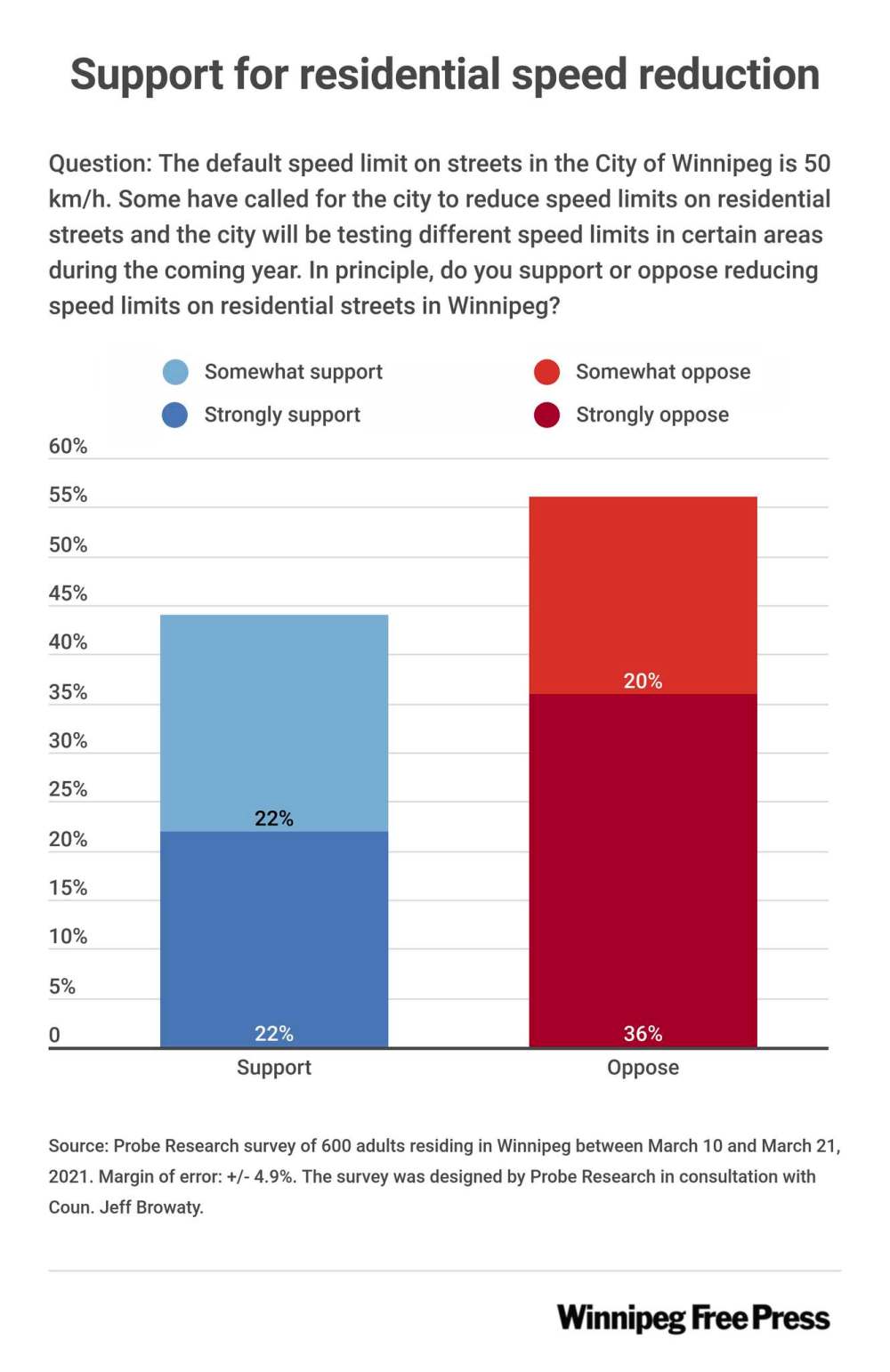Most city drivers want speed limit kept as is: poll
Advertisement
Read this article for free:
or
Already have an account? Log in here »
To continue reading, please subscribe:
Monthly Digital Subscription
$0 for the first 4 weeks*
- Enjoy unlimited reading on winnipegfreepress.com
- Read the E-Edition, our digital replica newspaper
- Access News Break, our award-winning app
- Play interactive puzzles
*No charge for 4 weeks then price increases to the regular rate of $19.00 plus GST every four weeks. Offer available to new and qualified returning subscribers only. Cancel any time.
Monthly Digital Subscription
$4.75/week*
- Enjoy unlimited reading on winnipegfreepress.com
- Read the E-Edition, our digital replica newspaper
- Access News Break, our award-winning app
- Play interactive puzzles
*Billed as $19 plus GST every four weeks. Cancel any time.
To continue reading, please subscribe:
Add Free Press access to your Brandon Sun subscription for only an additional
$1 for the first 4 weeks*
*Your next subscription payment will increase by $1.00 and you will be charged $16.99 plus GST for four weeks. After four weeks, your payment will increase to $23.99 plus GST every four weeks.
Read unlimited articles for free today:
or
Already have an account? Log in here »
Hey there, time traveller!
This article was published 01/04/2021 (1688 days ago), so information in it may no longer be current.
Winnipeggers don’t want the speed limit lowered on residential streets, a new poll has found, despite a strong lobby effort to get city hall to slow drivers down.
A Probe Research poll commissioned by Coun. Jeff Browaty asked 600 Winnipeggers about reducing the default speed limit on residential streets. A majority (56 per cent) said they opposed the change, while 44 per cent supported it.
If given a chance to vote on a plebiscite to reduce the residential speed limit to 30 km/h from 50 km/h, 66 per cent said they would vote “no,” 26 per cent said they’d vote “yes” and eight per cent weren’t sure.

Browaty (North Kildonan), who opposes lowering the limit, said the findings show most Winnipeggers agree with him.
“It is pretty clear that… most of Winnipeg is opposed to the 30 (km/h speed limit) and lowering it in general,” he said.
The councillor said he hopes the feedback will help to convince his council colleagues to keep the current residential speed limit. Last year, the majority of council members voted in favour of a one-year pilot project to test a 30 km/h speed limit on five residential streets, though no exact date has been set for that to begin. Browaty opposed the change.
He said he remains convinced the city shouldn’t pursue speed reductions because roads are safe under the current limits.
“I think there are a lot of responsible people who, on the more major local streets, will drive up to 50 km/h and can do so safely,” he said. “I hope these polling numbers will give an opportunity for my colleagues to reflect on what their constituents are thinking.”
The Probe Research poll surveyed a random and representative sample of 600 Winnipeg adults online and by phone between March 10 and 21. The results are considered accurate within plus or minus 4.9 percentage points, with 95 per cent certainty.
Winnipeg groups that have pushed council to reduce the speed limit argue the change is needed to improve safety.
And that risk is why all speed limit decisions must be handled by experts, not guided by public opinion, said Mark Cohoe, executive director of Bike Winnipeg.
“We’re not putting fire regulations to a plebiscite, why are we putting traffic safety to a plebiscite? We lose lives in this city due to people getting hit by cars. It’s unfortunate and I think we want to make sure that goes down to zero,” said Cohoe.
The World Health Organization says pedestrians have a 90 per cent chance of survival when hit by a car travelling at 30 kilometres per hour, but that drops to less than 50 per cent when the car travels at 45 km/h.
Mel Marginet, a sustainable transportation co-ordinator for the Green Action Centre, said she’s not surprised by the opposition to a reduced speed limit, something for which she has advocated.
“Change is always hard and… a majority of Winnipeggers get around by personal vehicles and few people experience their neighbourhood on foot or by bike. So I think we just minimize that threat or we don’t appreciate how intimidating that is,” said Marginet.
She expects public support would grow for a reduced speed limit on residential streets once Winnipeggers try them out.
joyanne.pursaga@freepress.mb.ca
Twitter: @joyanne_pursaga

Joyanne is city hall reporter for the Winnipeg Free Press. A reporter since 2004, she began covering politics exclusively in 2012, writing on city hall and the Manitoba Legislature for the Winnipeg Sun before joining the Free Press in early 2020. Read more about Joyanne.
Every piece of reporting Joyanne produces is reviewed by an editing team before it is posted online or published in print — part of the Free Press‘s tradition, since 1872, of producing reliable independent journalism. Read more about Free Press’s history and mandate, and learn how our newsroom operates.
Our newsroom depends on a growing audience of readers to power our journalism. If you are not a paid reader, please consider becoming a subscriber.
Our newsroom depends on its audience of readers to power our journalism. Thank you for your support.

